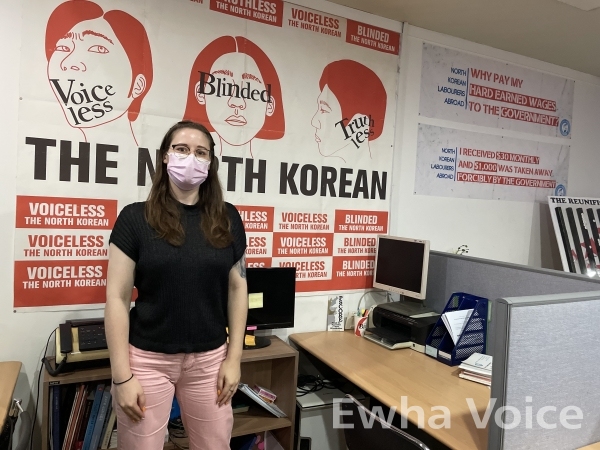
Photo by Yoon Chae-won
Gaining experience in foreign countries through exchange programs or internships can be crucial for students interested in the foreign job market. Hailing from Germany, Christina Kunz is one of those students who chose to pursue her interests through internships outside Germany– in her case, in South Korea.
Intriguingly, Kunz’s choice was to work for peace on the Korean peninsula. She came to South Korea four years ago to pursue a Master’s degree in East Asian Studies and International Relations. As a part of her journey in Korea, Kunz also applied for an internship at the non-governmental organization (NGO) called People for Successful COrean REunification (PSCORE), based in Seoul.
The organization advocates human rights in North Korea on an international and domestic level– from giving statements and publishing reports at international conferences to providing educational activities for North Korean defectors. PSCORE is now the only NGO dedicated to North Korean human rights that has been holding special consultative status with the UN’s Economic and Social Council since 2012, meaning they have a direct contact with UN.
Kunz is part of the research team at PSCORE, where they delve into analyzing big data and interviewing North Korean defectors. These largely go into writing reports related to North Korean human rights issues presented to the UN and the general public alike.
“We are also trying to spread the word about the North Korean issues globally,” Kunz said. “For example, on PSCORE’s YouTube channel, I made a video explaining the situation of North Korea in German to reach a German audience.”
Spreading the word on human rights issues in North Korea holds a special place in Kunz’s interest. PSCORE’s work focuses on education and research. It plays to Kunz’s ambition to raise awareness about issues she feels are vitally important to the world at large, not just in South Korea.
“What we are trying to make people understand is that we have to start at the bottom,” Kunz said. “You have to gain a basic understanding of what people are struggling with, why people are oppressed, and how the lives of North Koreans are in danger. If people understand this, they can start discussions and educate others about this.”
The work had come with rewarding moments for Kunz, like when PSCORE hosted the first Model United Nations conference for Korean reunification. It was the first time she felt as though she witnessed an immediate impact of her work on others as she watched the delegates debate on the issues her team presented based on the research that her team had published.
However, like all the other internships, there have been both ups and downs along the way. Working on Korean issues with a pool of international volunteers, cultural gaps amongst interns from different countries did present some challenges, but this was part of the process for Kunz. Solving the obstacles was yet more positive learning curves. According to Kunz, going back to the basics about PSCORE’s work always solves any highlighted issues– raising awareness of North Korean human rights to the international community.
“Something I take for granted can be accepted totally differently from other cultures,” Kunz said. “I inevitably see things from a German standpoint because I am German, but I should stand from a Korean and international perspective. Otherwise, we would not represent our NGO’s view.”
To fully understand North Korean issues, Kunz added that both foreigners like herself, and Koreans must study the history of the two Koreas. She believes the peninsula’s situation is more than just a wall on the 38th parallel line, which divides North and South.
“The willingness to be open-minded to history and all the complexities behind it is important,” Kunz said. “Without knowing this, we would generalize them and casually say that everyone in North Korea is terrible. In fact, there are North Koreans who wish to change the regime, and not every North Korean has a polarized ideology.”
Unlike studying for her master’s degree, where she could only study intergovernmental aspects of North Korean issues, working with PSCORE broadened the scope of her work and interest. She learned how to perceive North Korean issues microscopically and is now trying to resolve human rights abuses in the secretive regime. According to Kunz, her internship has been an eye-opening experience.
As PSCORE’s work continues, Kunz and her team plan to work on human rights issues in North Korea continuously. Starting last year, children’s rights in North Korea has been their main focus. Working for peace on the Korean peninsula remains a dedicated interest for Kunz. She recommends other foreigners to come to Korea and participate in meaningful internships like hers.
“It’s important to care,” she said. “About the crucial issues happening to people who are living where you are right now.”

